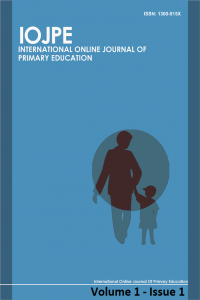Abstract
References
- Aşkar, P. (1986). Developing a likert-type scale measuring the attitude towards Mathematics. Eğitim ve Bilim, 11(62), 31-36.
- Campbell, D. (2002). Mozart effect for children. New York: Harpen Collins.
- Dinçer, M. (2008). The effect of teaching made with musiced mathematics games in primary schools on academic achievement and attitude. Unpublished Master Thesis, Abant İzzet Baysal University, Institute of Educational Science, Bolu.
- Geoghegan, N., & Mitchelmore, M. (1996). Possible effects of early childhood music on mathematical achievement. Australian Research in Early Childhood, 1, 57-64.
- Hancock, D. R. (2001). Effect of test anxiety and evaluative threat on students' achievement and motivation. The Journal of Educational Research, 94, 284-290.
- Hedl, J. J. (1972). Test anxiety: A state or trait concept? Summary. In Proceedings of the 80th Annual Convention of the American Psychological Association, 7 (pp. 503-504). Washington, DC: American Psychological Association.
- Önsü, A. (2005). The effect of exercises with music on permanent concern and this ımpact's being supported by brain waves. Unpublished Master Thesis, Kocaeli University, Institude of Medical Science, Kocaeli.
- Rubenzer, R. L. (1988). Stress management for the learning disabled. Reston, VA: ERIC Clearinghouse on Handicapped and Gifted Children.
- Sarason, I. G. (1980). Test anxiety: Theory, research, and applications. Hillsdale, NJ: Lawrence Erlbaum.
- Sezer, F. (2009). The effect of therapy with music on test anxiety, anger, and psychological symptoms. Unpublished Doctorial Thesis, Atatürk University, Institude of Social Science, Erzurum.
- Speilberger, C. D., & Vagg, P. R. (Eds.). (1995). Test anxiety: Theory, assessment, and treatment. Washington, DC: Taylor & Francis.
- Tan, H. (1992). Psychological counseling and guidance. İstanbul: MEB Yayınları
- Tobias, S., & Everson, H. T. (1997). Studying the relationship between affective and metacognitive variables. Anxiety, Stress, and Coping, 10, 59–81.
- Trent, J. T., & Maxwell, W. A. (1980). State and trait components of test anxiety and their implications for treatment. Psychological Reports, 47, 475-480.
THE EFFECT OF MUSIC ON THE TEST SCORES OF THE STUDENTS IN LIMITS AND DERIVATIVES SUBJECT IN THE MATHEMATICS EXAMS DONE WITH MUSIC
Abstract
In the exams based on limits and derivatives, in this study, it was tried to determine that if there was any difference in students' test scores according to the type of music listened to and environment without music. For this purpose, the achievement test including limits and derivatives and whose reliability coefficient of Cronbach Alfa is .83 was applied with the environments in which different types of music were listened, to 98 students studying at Primary Mathematics Teaching Department in Buca Faculty of Education in Dokuz Eylul University. As a result, it was observed that both male and female students' test scores form the exam based on limits and derivatives compared to the environment without music; besides, the increase in average number of correct answers of female students was higher than the male students'.
References
- Aşkar, P. (1986). Developing a likert-type scale measuring the attitude towards Mathematics. Eğitim ve Bilim, 11(62), 31-36.
- Campbell, D. (2002). Mozart effect for children. New York: Harpen Collins.
- Dinçer, M. (2008). The effect of teaching made with musiced mathematics games in primary schools on academic achievement and attitude. Unpublished Master Thesis, Abant İzzet Baysal University, Institute of Educational Science, Bolu.
- Geoghegan, N., & Mitchelmore, M. (1996). Possible effects of early childhood music on mathematical achievement. Australian Research in Early Childhood, 1, 57-64.
- Hancock, D. R. (2001). Effect of test anxiety and evaluative threat on students' achievement and motivation. The Journal of Educational Research, 94, 284-290.
- Hedl, J. J. (1972). Test anxiety: A state or trait concept? Summary. In Proceedings of the 80th Annual Convention of the American Psychological Association, 7 (pp. 503-504). Washington, DC: American Psychological Association.
- Önsü, A. (2005). The effect of exercises with music on permanent concern and this ımpact's being supported by brain waves. Unpublished Master Thesis, Kocaeli University, Institude of Medical Science, Kocaeli.
- Rubenzer, R. L. (1988). Stress management for the learning disabled. Reston, VA: ERIC Clearinghouse on Handicapped and Gifted Children.
- Sarason, I. G. (1980). Test anxiety: Theory, research, and applications. Hillsdale, NJ: Lawrence Erlbaum.
- Sezer, F. (2009). The effect of therapy with music on test anxiety, anger, and psychological symptoms. Unpublished Doctorial Thesis, Atatürk University, Institude of Social Science, Erzurum.
- Speilberger, C. D., & Vagg, P. R. (Eds.). (1995). Test anxiety: Theory, assessment, and treatment. Washington, DC: Taylor & Francis.
- Tan, H. (1992). Psychological counseling and guidance. İstanbul: MEB Yayınları
- Tobias, S., & Everson, H. T. (1997). Studying the relationship between affective and metacognitive variables. Anxiety, Stress, and Coping, 10, 59–81.
- Trent, J. T., & Maxwell, W. A. (1980). State and trait components of test anxiety and their implications for treatment. Psychological Reports, 47, 475-480.
Details
| Primary Language | English |
|---|---|
| Subjects | Other Fields of Education |
| Journal Section | Research Articles |
| Authors | |
| Publication Date | June 30, 2012 |
| Published in Issue | Year 2012 Volume: 1 Issue: 1 |
Creative Commons Licenses

All articles published in International Online Journal of Primary Education's content is licensed under a Creative Commons Attribution 4.0 International License (CC BY 4.0).
(Counter start: February 28, 2021)





